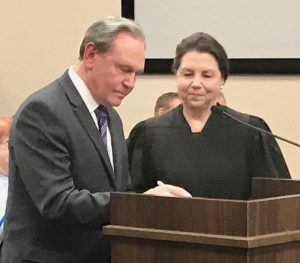Appointed Fort Smith director seeks to support ‘momentum,’ help with ‘specialty knowledge’
by April 7, 2019 5:47 pm 1,465 views

Lavon Morton, the only Fort Smith City Director with an IMDB (Internet Movie Database) page, noted at the April 2 city board meeting that although he was appointed to the position, he intends to use his extensive corporate knowledge to work hard for Ward 3 residents and the overall benefit of the city.
Morton was appointed April 2 to fill the board vacancy of Mike Lorenz. Lorenz stepped down effective March 12 when he and his family moved to Oklahoma City following a job promotion. City ordinances allow the vacancy to be filled by Board appointment or special election open only to Ward 3 residents. An election would cost the city about $15,000 and could not be held until July, and a director would not be sworn in for Ward 3 until August. The Ward 3 post will be up for re-election in 2020.
Morton retired as senior vice president – risk and chief audit executive at ArcBest in December 2016, following a 20-year career with the company. He served on the city’s Audit Advisory Committee for about 15 years. Morton’s duties with ArcBest, a global logistics and shipping company with a market capitalization of around $850 million, included helping the publicly-held company comply with a myriad of federal Securities and Exchange Commission rules, working with teams to incorporate acquisitions, help manage non-union pension funds valued at more than $120 million, and help the company balance the liabilities of 25 separate multi-employer pension funds.
He’s the only city director in recent decades to have such extensive corporate finance and accounting experience.
“There is some specialty knowledge I mentioned last week regarding specifically pensions and making sure the city is charged the proper pension cost. The (city’s) audit committee as a group has done some work on that already, and I want to continue that work,” Morton told Talk Business & Politics during an April 2 interview.

The city has for years struggled to fund the Local Police and Fire (LOPFI) pension for police and fire employees. As of June, the LOPFI retirement pension plans that ended in 1983 had a projected insolvency date of 2026 with an estimated unfunded liability of $18 to $20 million, Fort Smith Finance Director Jennifer Walker said in June.
City officials in 2017 had to find $1 million in an already squeezed general fund budget to meet its LOPFI obligation. However, recent projections indicate annual payments of $750,000 will keep the fund solvent. Morton said his focus is not on changing the benefits paid out, but to ensure that LOPFI has “accurate” information used to determine the city’s financial input.
The most pressing immediate need for the city is the consent decree that has resulted in a 167% increase in water and sewer bills for city residents and businesses. The city entered into a federal consent decree with the U.S. Department of Justice and U.S. Environmental Protection Agency in late 2014 without fighting it in court. The consent decree requires the city to make an estimated $480 million worth of sewer upgrades over the course of 12 years. On Aug. 10 city officials met with EPA officials in Dallas to discuss city-requested modifications to the 2015-enacted consent decree.
“We’re waiting on how that progresses,” Morton said about possible changes following the August meeting.
Another issue noted by Morton is helping the city maintain what he believes is positive “momentum.”
“I just want to see the city continue to move forward. We’ve had a lot of good things happen in the city over the past few years, and I just want to do everything I can to continue the momentum that’s been built up,” Morton said. “The theater in downtown is obviously a major positive development.”
64.6 Downtown announced March 25 that renovation of an historic theater in downtown Fort Smith would move into the construction phase in October with expected completion by December 2020 or January 2021. The theater, located at Ninth N. 10th St., underwent many renovations over the years and was adapted to a movie theater in the 1940s. It has been vacant for decades. Richard Griffin and the Griffin Family trust donated the building, which was listed on the National Register of Historical Places in 1999, to 64.6 for a renovation that will turn the theater into a regional hub for performing arts, music and dance.
Morton also said the city may want to do more to support the Arkansas Colleges of Health Education (ACHE). The college houses the Arkansas College of Osteopathic Medicine, which welcomed an inaugural class of 150 osteopathic medical students in August 2017. Those students will begin their third year in August and graduate in May 2021.
In May 2018 ACHE officials broke ground on the Colleges of Health Sciences. The college will house the doctor of physical therapy, doctor of occupational therapy, and physician’s assistant programs. The 66,000-square-foot facility – now under construction – is estimated to cost around $25 million, including construction, furniture, equipment, technology, and accreditation. It will result in 30 faculty positions with annual pay, on average, of $100,000 each.
“The Arkansas Colleges of Health Education is a huge positive for the city … and the people running that deserve a tremendous amount of credit for what they’ve already done. And they have a press release basically every week on something new they’ve done that is very impressive, and I think we should all give that more attention than what we do,” Morton told Talk Business & Politics.
